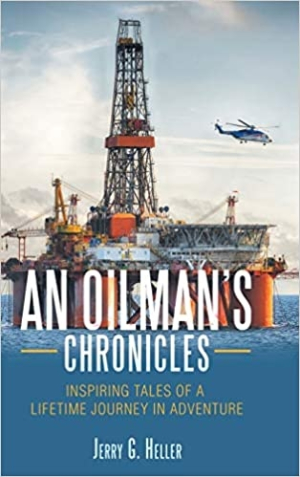An Oilman’s Chronicles
Inspiring Tales of a Lifetime Journey in Adventure
An Oilman’s Chronicles is a memoir that is emphatic in exulting what family love adds to life.
Jerry G. Heller’s amiable memoir An Oilman’s Chronicles recounts how a bucolic Dutch childhood led toward an accomplished technical career.
Born four years after the end of World War II, Heller loved his childhood days on his family’s farm—playing with his siblings and their animals, watching the neighbors, and engaging in minor hijinks. His memories of the period are colored by peace and contentment: “Life was good.” This is true even when Heller recalls roadblocks, as with a consuming fire that forced his family to build a new, modern home.
Here, the old ways are not recalled in terms of deprivation, but with matter-of-fact joviality. Because his home life was happy and encouraging, Heller was able to enter his young adulthood with unbridled fervor: he joined a rock band, tricked his school’s nuns when it was necessary to have some fun, and fell in love with the girl who eventually became his wife, all before he left his teen years behind.
The book’s topical chapters move fast through the happy, curious, and formative events of Heller’s life, their tones often quixotic. Heller’s summations of his children’s youths are cheerful and adoring, summed up with “they were always so lovely”; his recollections of backpacking into France on a shoestring budget are joyous, even in recalling troubles; even a breakdown of the family RV abroad is recorded with memories of the songs that Heller sang while his wife and children worried and grew restless. There are accounts of misdeeds in the text, too—a borrowed moped, queue jumping, and some delicious stolen custard; they are also narrated with joie de vivre.
The topical arrangement leads to some timeline jumping, though. Heller’s love story, including his marriage and the arrival of his children, is covered in one chapter; a subsequent chapter skips back to a period when he and his wife were still dating, and encompasses a temporary break that led Heller to a short relationship with someone else. Because the narration is accomplished with the speed of an oral tale, audience adjustments to account for such timeline switches are often swift. Still, two of the book’s later chapters, which focus on genealogy pursuits and travels in the US, are an odd fit with the material that surrounds them, as is a postscript chapter that covers recent clean energy technologies.
Ultimately, Heller’s memories from home make for more compelling reading than those from the field, which recount challenges like oil spills, redundant parts orders, and broken machinery, as well as business procedurals, like contract negotiations. The latter are often bogged down by technical details, and are likely to be of limited interest to those without inside knowledge of the industries the book mentions. They include occasional, pert, impressionistic travel recommendations and side stories, however—including of an office lottery windfall, and of a coworker who had to extend a work trip in order to let the evidence of his infidelities fade—that help to broaden their interest. Still, because the book’s early chapters establish a sense that Heller worked to live, rather than living to work: Heller’s celebrations of his family and home lives seem a more natural point of focus. They are infused with warmth and contagious delight.
An Oilman’s Chronicles is a memoir that is emphatic in exulting what family love adds to life.
Reviewed by
Michelle Anne Schingler
Disclosure: This article is not an endorsement, but a review. The publisher of this book provided free copies of the book and paid a small fee to have their book reviewed by a professional reviewer. Foreword Reviews and Clarion Reviews make no guarantee that the publisher will receive a positive review. Foreword Magazine, Inc. is disclosing this in accordance with the Federal Trade Commission’s 16 CFR, Part 255.

